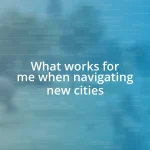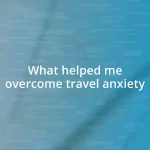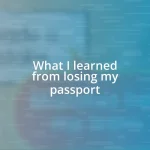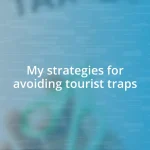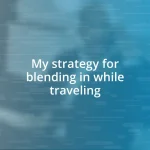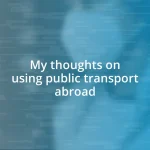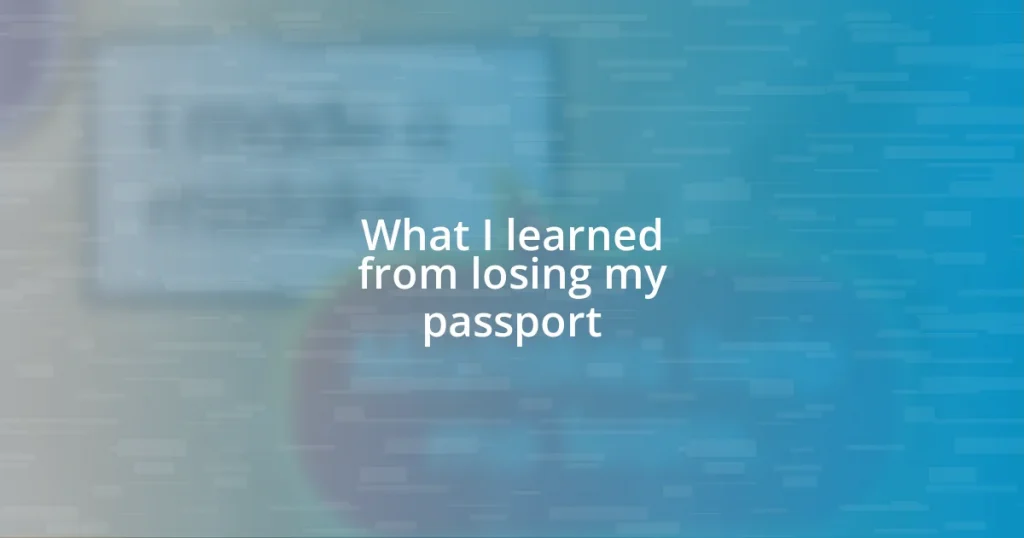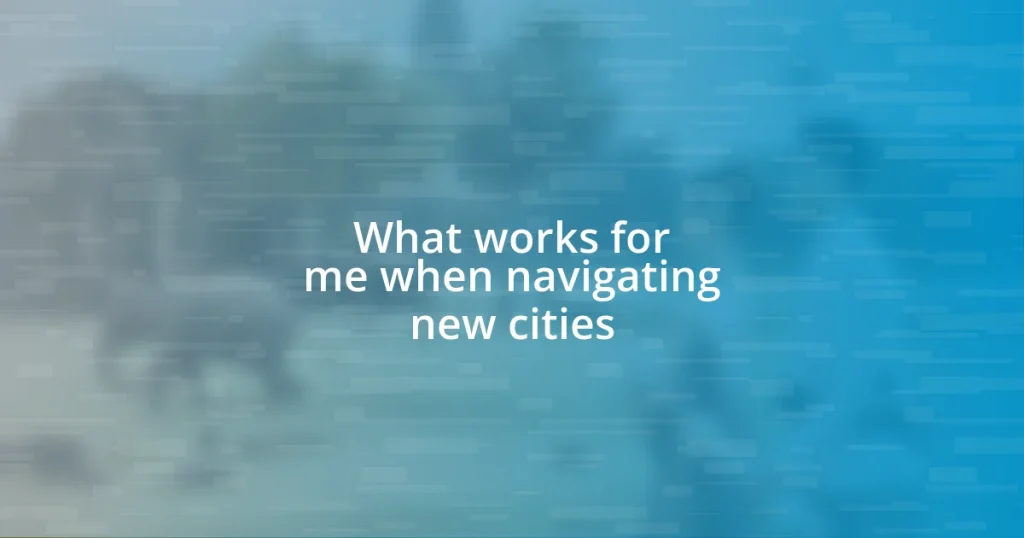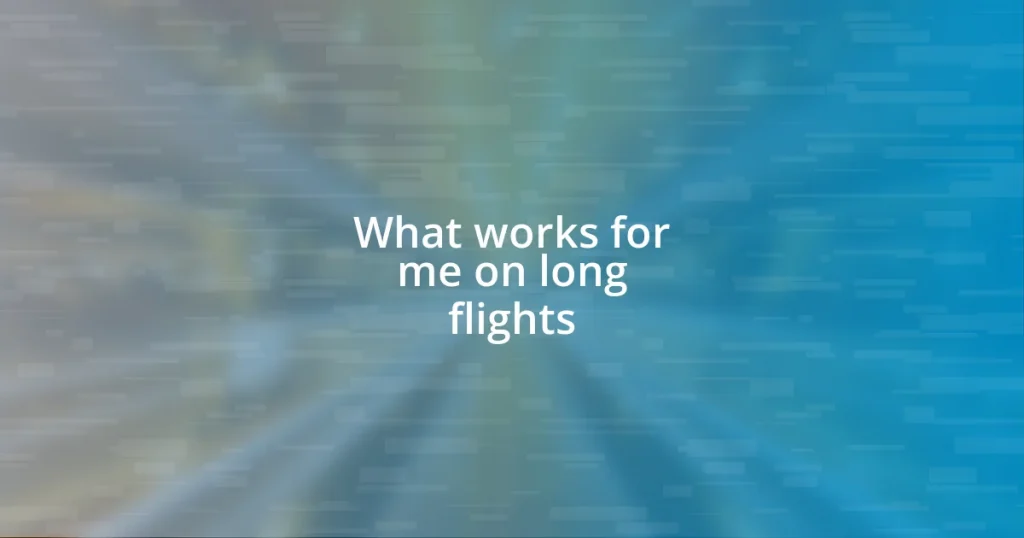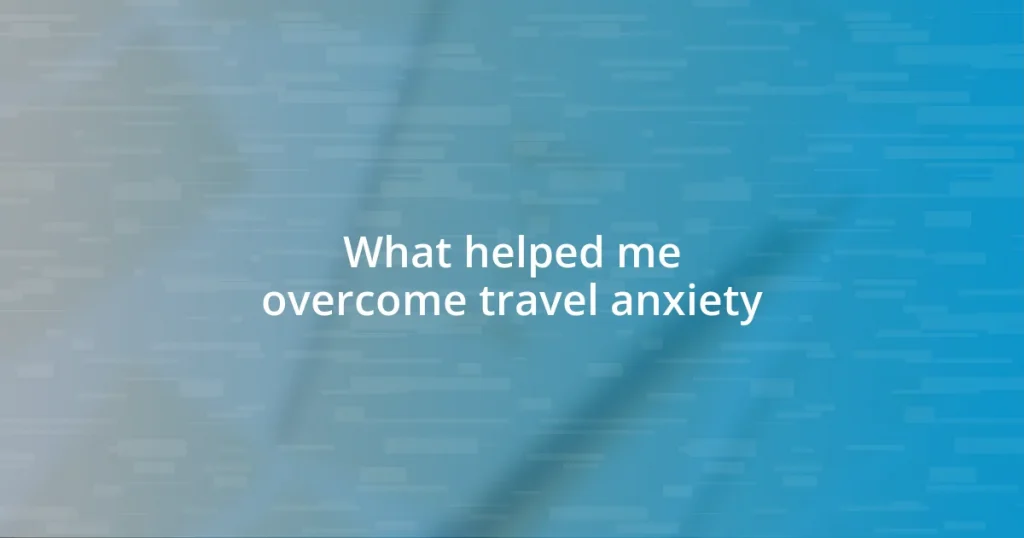Key takeaways:
- Losing a passport significantly impacts one’s sense of identity, leading to feelings of anxiety, frustration, and helplessness, highlighting the fragility of our circumstances.
- Practical steps like keeping photocopies, using a travel wallet, and establishing routine checks can help prevent passport loss and minimize stress.
- Managing emotions during loss involves acknowledging feelings, seeking support from others, and channeling anxiety into constructive actions to regain a sense of control.
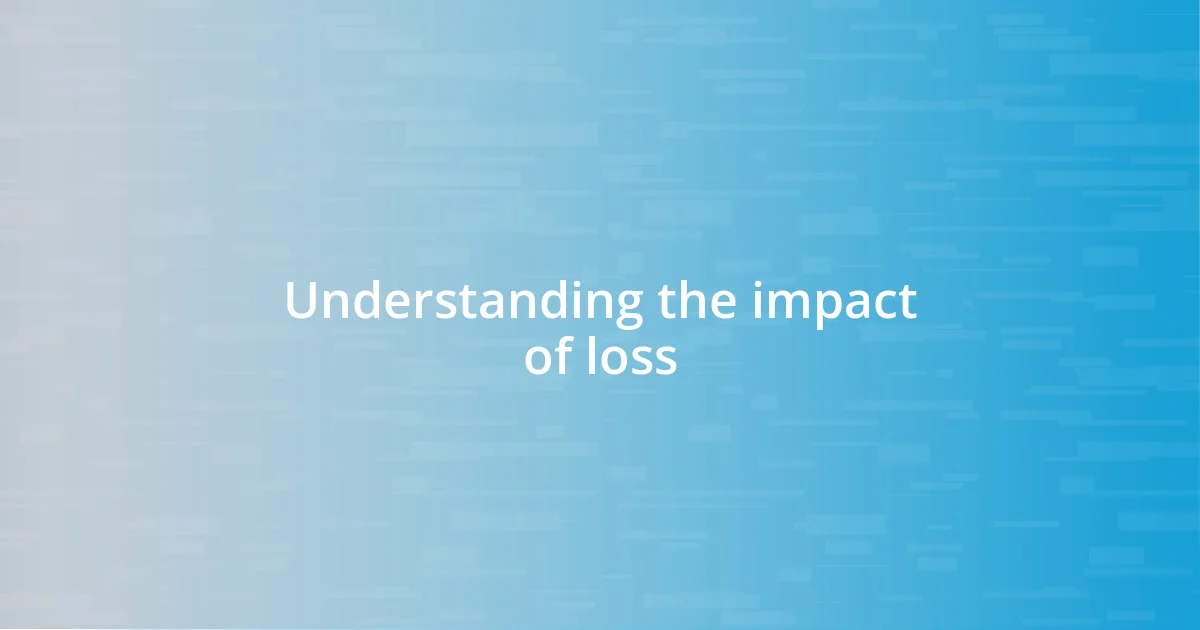
Understanding the impact of loss
Losing my passport feels like losing a piece of my identity. It’s surprising how much value we place on that little booklet — it symbolizes freedom, travel, and adventure. Have you ever felt a wave of panic wash over you at the thought of being trapped in a foreign country?
The moment I realized my passport was gone, I was flooded with anxiety and frustration. It wasn’t just about the physical loss; it was everything that came with it — the canceled plans, the endless hours spent at the consulate, and the looming uncertainty about whether I could continue my journey. I still remember the sinking feeling in my stomach when I thought about all those memories yet to be made that now hung in the balance.
What struck me the most was the helplessness that enveloped me. I had done everything right to protect my passport, yet life has a way of throwing us curveballs. It made me appreciate the little things we often take for granted, like plans that seem solid and possessions that feel secure. How often do we overlook the fragility of our circumstances, assuming they will remain unchanged?
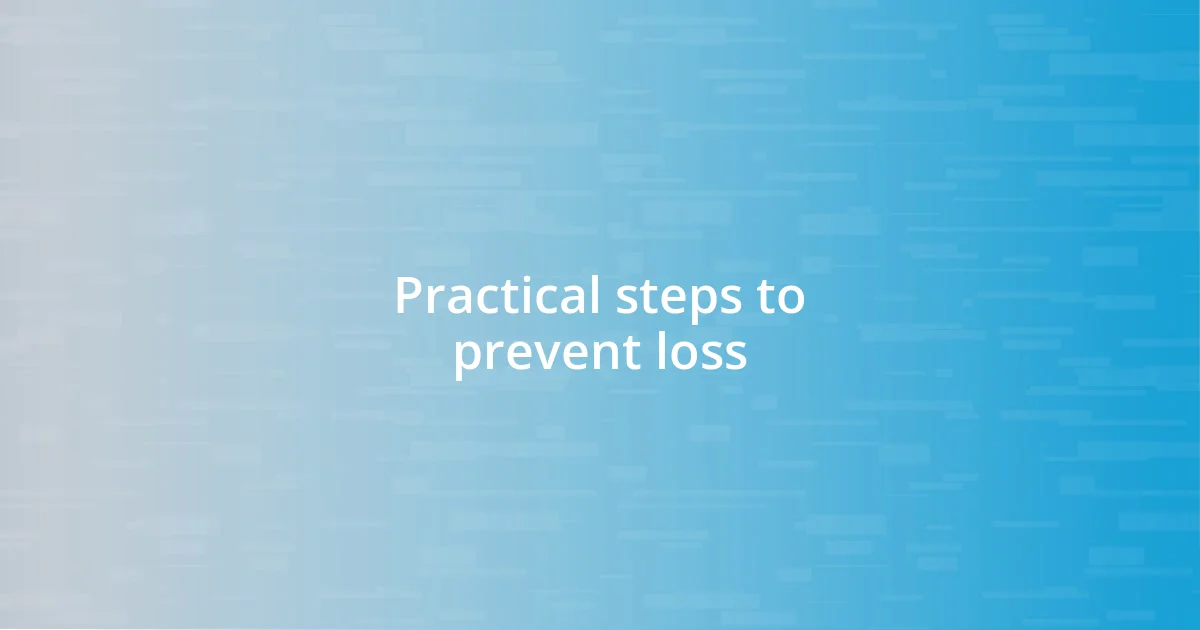
Practical steps to prevent loss
Keeping your passport safe is crucial for any traveler, and I’ve found a few practical steps that really help. First off, I always make photocopies of my passport and store them separately from the original. It’s such a simple trick, but when I lost my passport, having those copies made it easier to report the loss and get things rolling with the consulate.
Another step I can’t stress enough is to use a travel wallet or pouch. I learned this the hard way; during my last trip, I simply stuffed my passport in my bag with everything else. It slipped deep into a pocket, and I spent an hour frantically searching for it. Now, I keep my passport in a designated spot that’s secure and easy to access, which brings me peace of mind.
Lastly, set reminders about where your passport is, especially if you’re switching accommodations. I’ve had moments where I thought I left it in one hotel, only to find it tucked away in another. If I establish a routine for checking my passport before I leave, it significantly lowers the chance of losing track of it. Trust me, these small habits can save you from a ton of stress.
| Step | Description |
|---|---|
| Photocopies | Keep copies stored safely; they help when reporting a loss. |
| Travel Wallet | A designated pouch can help prevent misplacement. |
| Routine Checks | Establish a habit of checking your passport regularly. |
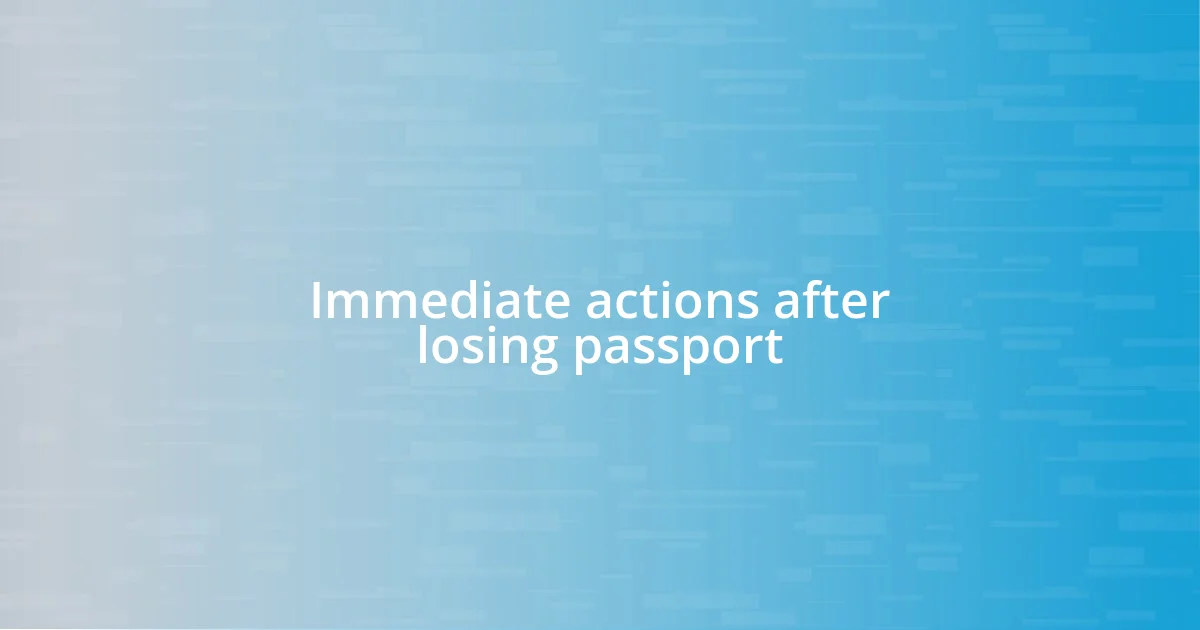
Immediate actions after losing passport
Upon realizing my passport was missing, my first instinct was to retrace my steps. I stood there in disbelief, scanning the last places I’d visited, hoping to catch a glimpse of that familiar blue cover. The urgency was palpable; time felt like it was slipping away as I sprang into action.
Here’s a list of immediate actions that I found helpful when faced with this situation:
- Stay Calm: Take a deep breath; panicking will only cloud your judgment.
- Retrace Your Steps: Think back to where you last had the passport; check those places quickly.
- Inform Local Authorities: Report the loss to local law enforcement if theft is suspected.
- Contact Your Embassy: Reach out for guidance on replacement procedures specific to your situation.
- Secure Your Travel Plans: Cancel or adjust any reservations that depend on your passport.
As I was making calls to the embassy, an overwhelming sense of vulnerability washed over me. My heart raced as I imagined the complications ahead. I distinctly remember standing in line, feeling the weight of uncertainty, but I reminded myself that tackling one step at a time was the best approach. Every small action brought a little more clarity amid the chaos.
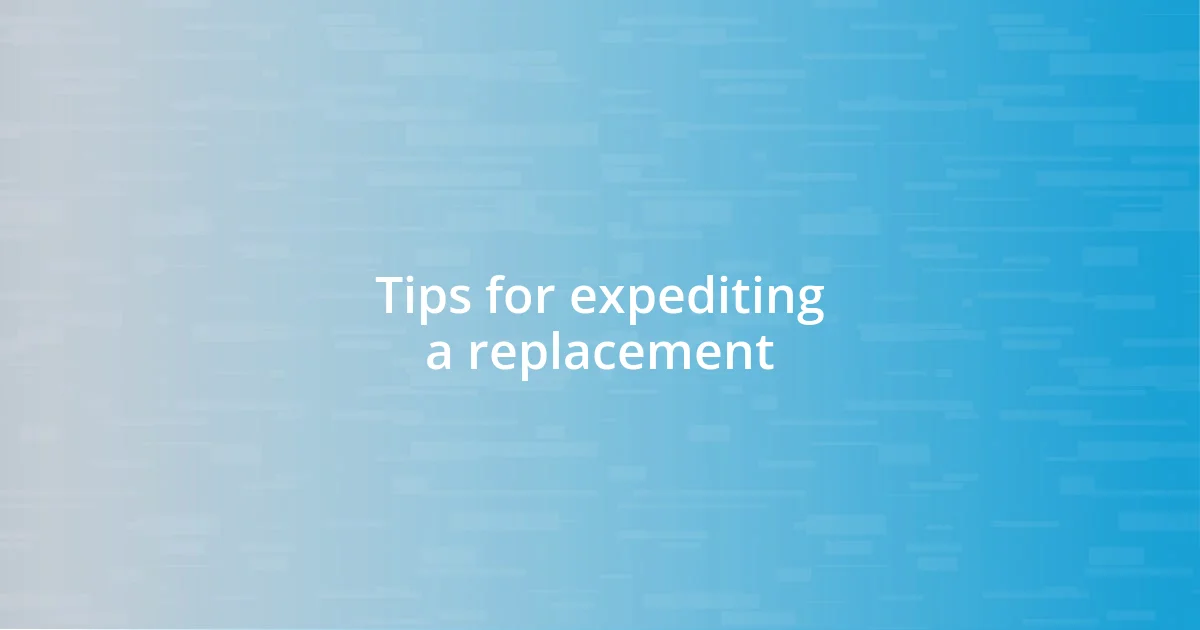
Tips for expediting a replacement
One of the fastest ways to expedite a replacement passport is to gather all your necessary documents before you head to the embassy or consulate. When I lost mine, I learned that having a completed application form, two passport-sized photos, and any supporting documentation like a police report or identification made the process significantly smoother. Think about it: who wants to make multiple trips just to submit a piece of paper?
If possible, book an appointment online. I can’t tell you how much time I wasted waiting in line without a reservation. When I finally got an appointment, I was in and out within an hour. Your time is precious, especially when you have travel plans looming. Plus, some embassies even offer expedited services for an additional fee, which, in my experience, is totally worth it when you’re in a pinch.
Lastly, don’t hesitate to communicate your situation to the staff at the embassy. A friendly, honest conversation can sometimes open doors that a standard procedure might not. I remember explaining my urgency, and the officer went above and beyond to help expedite my replacement. Have you ever encountered someone who turned a stressful moment into a manageable experience? It’s moments like these that remind me of the power of empathy in unexpected places.
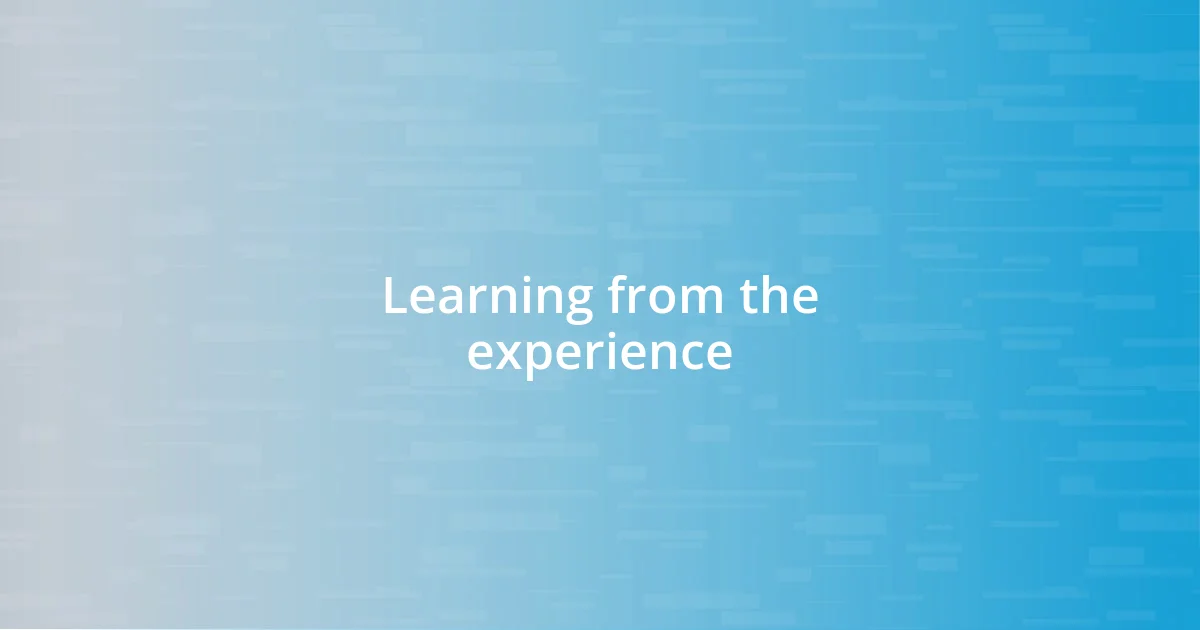
Learning from the experience
Learning from losing my passport was a turning point that taught me resilience in the face of unexpected challenges. After that experience, I understood the importance of preparation. Now, I regularly keep photocopies of important documents, including my passport, in different locations. Have you ever found comfort in being over-prepared? It’s a small change that provides me with peace of mind, knowing I have backup options if trouble strikes again.
In the thick of dealing with the loss, I realized how valuable my support network is. I reached out to friends who offered both emotional support and practical help, like accompanying me to the embassy. It dawned on me that leaning on others during stressful times can turn a solitary battle into a shared journey. Isn’t it remarkable how vulnerability can foster stronger connections with those around us? Now, I prioritize building these relationships, knowing they can be a lifeline in emergencies.
I also learned to embrace adaptability. Instead of mourning the lost passport, I focused on what I needed to move forward. I started viewing obstacles as opportunities to grow and learn new skills. Have you ever faced a situation that pushed you to develop in ways you never expected? It’s eye-opening, really; each challenge can become a stepping stone for personal development, paving the way for a more resilient future.
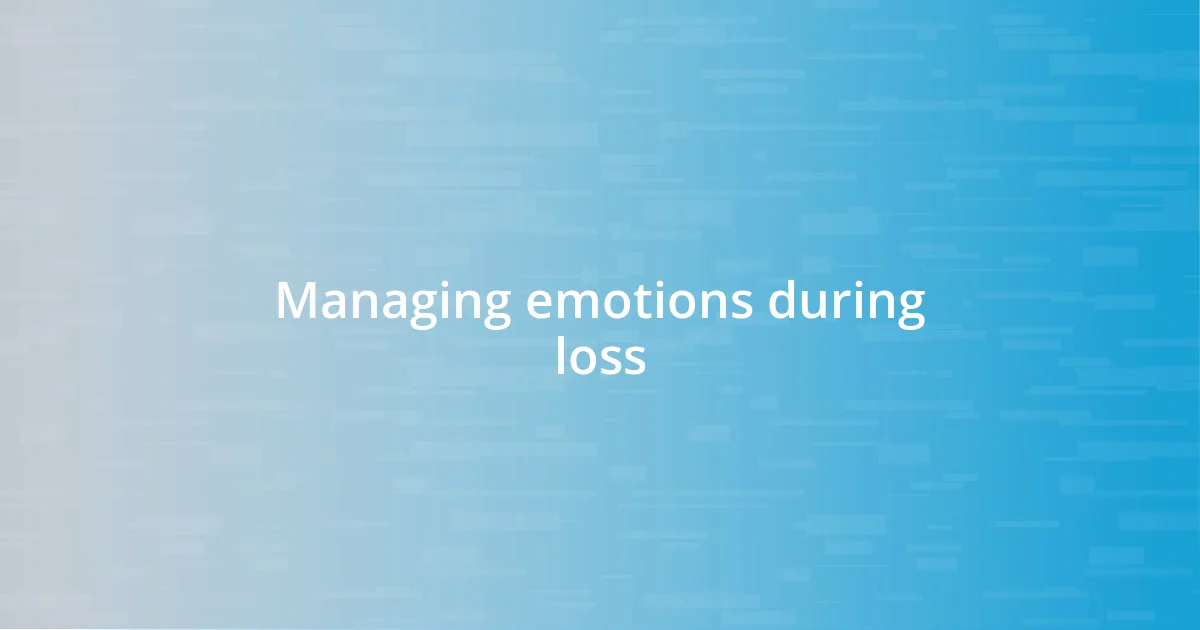
Managing emotions during loss
Managing emotions during loss is a delicate balance, and I found myself riding quite the emotional roller coaster when my passport went missing. Initially, I felt a wave of panic that made my heart race. Shifting from that initial shock to a more composed mindset took some work. I remember focusing on my breathing and reminding myself that I could find a solution. Have you ever felt overwhelmed by something seemingly minor that spiraled into a bigger emotional response?
As I navigated the chaos, I learned the importance of acknowledging my feelings rather than suppressing them. It was crucial for me to recognize that it was okay to feel stressed or frustrated. I remember expressing my worries to a family member, and instead of trivializing my concerns, they validated my feelings. That simple act of sharing made all the difference. Do you ever find relief in sharing your struggles with someone who listens without judgment?
Eventually, I discovered that channeling my emotions into action was empowering. Instead of wallowing in despair, I focused on what I could control—gathering necessary documents and reaching out for support. Taking those proactive steps not only alleviated my anxiety but also reinforced my sense of agency. I often think about how engaging with our feelings can guide us toward constructive actions. Have you ever found strength in taking charge of a situation, even when it felt daunting?

